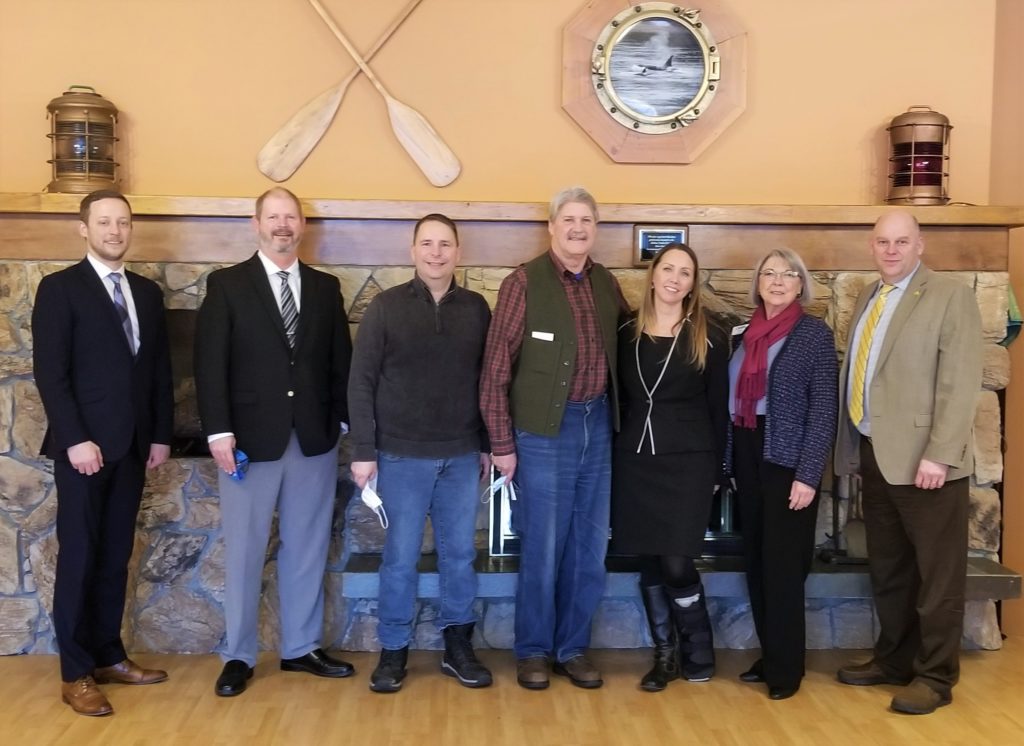Chamber Convenes Partners for Legislative Sendoff

On Friday, January 7, the Shelton-Mason County and North Mason Chambers of Commerce, EDC of Mason County and City of Shelton hosted a Legislative Sendoff for Senator Tim Sheldon (D-Potlatch), Representative Dan Griffey (R-Belfair), and Representative Drew MacEwen (R-Union) of the 35th Legislative District. Following introductions, each legislator shared their thoughts on the previous year and what they hope for in the short, 60-day session.
All three legislators acknowledged the necessity of addressing the long-term care act. Sheldon self-identified as the only democrat who had voted against the tax and asserted, “actuarially the bill doesn’t work.” Griffey asserted the action, “actually collapsed an entire industry” and bemoaned the limited policies even available now outside of the government. MacEwen stated his hope that, at a minimum, the program will be suspended until a more comprehensive reform can be negotiated during the 2023 long session.
Legislators also agree that the law enforcement accountability bill is likely to be reviewed. Griffey called the bill “crippling” and he is committed to working, through the public safety committee on which he serves, to find solutions. He recognized the importance of public input and declared the pressure from constituents has caused the majority party to revisit these policies.
Sheldon highlighted that Mason County is the most rural district in the state and declared the importance of broadband for the county’s growth. He also lamented the lack of fire prevention education and spoke to the devastation and cost of forest fires. Lastly, he pinpointed two projects he’ll continue to champion: the Shelton Veterans Village, which was part of a multi-million-dollar appropriation made in 2017; and the State Route 3 Freight Corridor Project (formerly called the Belfair Bypass). He also mentioned two other bills: one to allow fire districts to use their own treasurer for bonding, and one to provide judicial discretion when addressing legal financial obligations for those seeking rehabilitation.
Griffey and MacEwen both pointed to last year’s virtual setting and remote testimony as a condition that made it easier for the majority to forward its agenda. MacEwen reproached the actions of the previous session and criticized the House for “putting its head in the sand” with regards to in-person activities and public input. Sheldon said that remote testimony can be easily manipulated by committee chairs, calling it “a phony thing.”
Looking ahead, Griffey touted three priorities which will be forwarded from the minority: a transportation package that fully funds the restoration process of all structurally deficient bridges and roadways without raising taxes; a budget written as if his party held the majority; and an environmental policy that reduces carbon without raising taxes. Griffey also shared his intent to propose support for transportation infrastructure. One bill designates rest areas as an essential function of the government; the other provides tax incentives to develop safe overnight parking. Griffey also spoke to the importance of getting people housed. He mused, “We spend hundreds of millions of dollars in Washington [through the] state budget on housing annually while building nearly no housing.” One other item which Griffey noted as a high priority this session is the elimination of the governor’s current emergency powers. He insisted that it is the duty of local elected representatives to write laws and railed, “The governor has no business [writing law].” Griffey expects Republicans will repeatedly raise a motion to that effect. He ceded that emergency powers have a useful role but decried the now multi-year state of emergency.
MacEwen emphasized the state’s financial circumstance, reflecting that when he was elected (in the same cycle as Governor Inslee) the state budget was 31 billion dollars. The most recent supplemental budget has ballooned, pushing spending to nearly 65 billion. He cited concern over inflationary pressures and reliance on consumption for revenue. MacEwen vowed that, in his role on the appropriations committee, he will continue to fight for a significant increase in the rainy-day fund. He too underscored the need to address the housing crisis. MacEwen also shared his plan to revive a proposal for an alternate funding model for transportation, using the sales tax generated from automobile sales. He indicates that the current model is unsustainable: while there is a push for lower carbon emissions and higher mileage standards, the current tax is still based on gas. “When you’re pushing one thing down while using that same revenue source to pay for everything, it’s not going to work.”
EDC board chair Joe Schmit acknowledged that the pandemic has provoked unprecedented economic recession. “Countless small businesses are still facing significant impacts despite federal relief and state investments,” he said. “When these things happen, we’re quick to feel the pain, but the recovery takes a long time. And while we are making progress toward recovery, our community is still struggling.” Keeping that in mind, he presented the local business priorities:
- Investing in infrastructure: nearly one dozen businesses who considered locating or expanding to Mason County were unable to meet their infrastructure needs, resulted in a potential loss of 850 jobs and about 640 million dollars in capital investment.
- Extending the 0.9 sales and use tax for public facilities and economic development activities in our rural communities. That tool attracts industry, diversifies economies, and also retains jobs.
- Supporting Commerce’s request for 7.5 million in the community economic revitalization board. That funding is critical to build infrastructure, foster job growth, and fund grants for shovel-ready manufacturing sites.
- Protecting state level leadership and funding for economic development, including full support for business, recruitment retention, and expansion programs.
Schmit drew attention to the impact of local businesses, specifically investments, job creation, and tax revenues. He charged, “Every state dollar leverages a match of at least six dollars from other public and private sources.”
City Manager Jeff Niten closed the presentations, expressing gratitude on behalf of City Council for the tremendous work the delegation did to repeal the Washington State Patrol Latecomer’s Agreement during the last session. The city asked legislators to consider removing the cap for Transportation Benefit Districts that fund road projects. Beyond that Niten named three specific requests—one each for economic development, public safety, and community life. Those include support for the satellite treatment/water reclamation plant to expand capacity and minimize effluent to Oakland Bay; creation of a secure parking area for law enforcement officers, court personnel, and emergency dispatchers; and replacement of the deck at the Shelton Timberland/William G. Reed Library.
The program concluded with presenting sponsors thanking the delegation as well as Shelton Yacht Club, who provided the venue for the event. Guests were invited to stay afterward and talk with legislators one-on-one.
Contact and Information About the Legislators
Senator Tim Sheldon
(D-Potlatch)
timothy.sheldon@leg.wa.gov
(360) 786-7668
417 Legislative Building
PO Box 40435
Olympia, WA 98504
Senator Tim Sheldon is a 35th District native and is the longest-serving member of the Legislature. He served 7 years in the House of Representatives – including 2 years as deputy majority leader – before being elected to the Senate in 1997. He has served as President pro tem of the Washington Senate and has served on many Senate Committees while authoring major legislation on job-training, infrastructure, job creation, and community notification of sex-offenders. He also served several terms as a Mason County Commissioner.
Outside of his political career, Sheldon served nearly a decade as executive director of the Economic Development Council of Mason County, followed by economic development work with Northwest Indian Tribes and has run his family’s logging, gravel, and oyster business since 1972.
Representative Dan Griffey
(R-Belfair)
dan.griffey@leg.wa.gov
(360) 786-7966
403 John L. O’Brien Building
PO Box 40600
Olympia, WA 98504
Representative Dan Griffey began his career of service as a volunteer firefighter at the age of 16 and was then the youngest EMT in Washington State. He continues now professionally as a lieutenant firefighter with Central Mason Fire & EMS. Dan has been a volunteer for multiple organizations including United Way and Habitat for Humanity. He has participated in Turning Pointe Survivor Advocacy Center’s Adopt-A -Room program and served meals at St. David’s in Shelton.
Griffey currently serves as the assistant ranking member on the Local Government Committee and serves on the Public Safety and Transportation committees; he has also been re-elected as the House Republican Whip. During his tenure he has passed legislation to protect survivors of sexual assault, fight crime, support our logging and shellfish industries, and to ensure government responsiveness and transparency.
Representative Drew MacEwen
(R-Union)
drew.macewen@leg.wa.gov
(360) 786-7902
427A Legislative Building
PO Box 40600
Olympia, WA 98504
Representative Drew MacEwen is on the House Republican leadership team, currently serving as assistant floor leader. He is also the ranking member of the Commerce and Gaming Committee and the assistant ranking member on the House Appropriations Committee. Additionally, he serves on the Joint Committee on Veterans’ and Military Affairs and the Joint Task Force on Economic Resilience of Maritime and Manufacturing in Washington.
Drew served in the United States Navy for six years. He is a graduate from its Nuclear Propulsion Program and holds a Bachelor of Science Degree from Excelsior College. He is the founder and president of the investment firm Falcon Financial Inc., and the managing partner for Mountain Lakes Capital and has invested in Mason and Kitsap county businesses. He is also active in many community organizations, including Rotary, Love INC, and is a past president of the Shelton-Mason County Chamber of Commerce.
